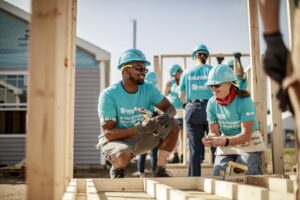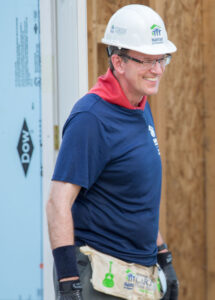In the Gospel of Mark, Jesus says to the Pharisees and scribes that a house divided against itself cannot stand. It is practical wisdom that is all too relevant in the world today. We must learn to build bridges, or we’ll all fall. And Habitat for Humanity is uniquely positioned to pass the hammer.
Habitat was founded almost 50 years ago at the height of the civil rights movement at Koinonia Farm, an interracial Christian farming community where Black and white homesteaders lived and communed together. They led the movement that would ultimately become the mission that we have today of putting God’s love into action by bringing people together to build homes, communities and hope.
Faith-based groups of volunteers were some of our first champions, and continue to be, but since then and throughout my tenure at Habitat, I’ve seen young and old, executives and laborers, Blacks and whites, Catholics and Protestants, and Hindus and Muslims working side by side. In some cases, working on a Habitat project is one of the first times people have interacted with someone outside of their socioeconomic class.

Habitat for Humanity Volunteers
Archbishop Desmond Tutu, patron of our work in South Africa, said, “As the physical walls of the home go up, the invisible walls that separate us as people come tumbling down and hope is built in the community.”
I have seen firsthand how the power of building – whether homes or hope – can improve lives.
One example is Habitat’s Beloved Community efforts, based on the vision of Dr. Martin Luther King, Jr., where we are focusing on creating a community that includes diversity and allows for tension undergirded by love.

Jonathan Reckford
As we continue to welcome and work with people of different backgrounds, cultures and faiths, we are able to continue to grow our ministry through the shared value of service. When I first joined Habitat 18 years ago, our work reached 125,000 people per year. In 2022, Habitat helped more than 7.1 million people build or improve a place to call home.
As the global housing crisis continues, there is more work to be done. Habitat’s deep commitment to communities around the world has created the opportunity for us to increase our influence, and one way we are doing that is through advocacy.
In May, we launched Home Equals, our new five-year global advocacy campaign focused on achieving successful policy changes at all levels of government to ensure people living in slums and informal settlements have equitable access to adequate housing.
At Habitat, we believe in a world where everyone has a decent place to live. As we pursue that vision, we will continue to welcome all as we work together through the shared value of service.
All photos courtesy of Habitat for Humanity. Visit their website at www.habitat.org
Jonathan Reckford is the author of Our Better Angels: Seven Simple Virtues That Will Change Your Life and the World. Follow Jonathan on Twitter @JReckford and on Instagram @JReckford.







